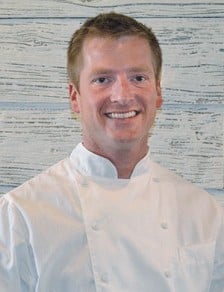A Closer Look: Lynn Pritchard
Executive Chef and Owner at Tartine

Pritchard grew up on a farm in a small Illinois town before attending culinary school in New York. He’s worked for restaurants in large markets like Dallas, Texas, and New York City, but has since settled down with his wife in Des Moines. Now, chef-owner of Tartine, a café and bistro in Clive that he helped open last year, Pritchard wants to focus on serving fresh, delicious food in a comfortable atmosphere. The restaurant has a new menu that Pritchard said will continue to evolve. “We’re going to continue to tweak it and move it forward in a dynamic, organic pattern,” he said.
Where did your interest in food come from?
My mother was an amazing baker and cook. She had about four love interests in her life: her family, the piano, her garden and cooking. If she was at home, she was on the piano, in the kitchen or in the garden. So I kind of grew up baking with my mom. My grandmothers were both great cooks; the whole lineage of great food was handed to me in love. Tragically, my mother passed away when I was young, and if I hadn’t learned to cook, I think my father would have starved. When I was in college, I realized I didn’t like what I was studying and it wasn’t fun. I had worked in restaurants for several years, and thought at least this is something I enjoy. I started checking into it and cooking schools. And it was lock and key.
What brought you back to the Midwest?
I’ve cooked in several larger markets. I think having that experience and also having lived in other larger markets, and the indebtedness I was in between school and the ‘rents, moving back to the Midwest made sense. I ultimately landed and lived on my family farm with one of my previous posts in the Quad Cities. That’s where I met my wife. And shortly after we were married, we moved to Des Moines.
Tell me about your new menu.
I’m pushing a seasonal and local influence. Obviously, growing up on a farm, I have a great deal of respect for stewards of the land and what their outputs are. I just see myself as a medium trying to express the love and craftsmanship that they’ve employed. It’s going to be a constant evolution. I probably won’t have constant new rollouts, but it’ll be more of tweaking and adjusting in a very dynamic and organic pattern.
Do you have any future plans?
I’m very, very much focused on the activity in these four walls. But I’m always thinking of those next projects, both in and outside these four walls. It gives both my wife and me a great deal of pause to get too far ahead of the curve. I’m grateful to live and work in Central Iowa right now. When we moved here – I was brought by the company I previously had worked for – and when they told me, I was a little depressed by it. But when we moved here, we immediately began making great connections and friends. I don’t know if I ever want to leave here. The willingness to be progressive in food, progressive in thought, people’s palates are just expanding.
How was it growing up on a farm?
Growing up on a farm is not terribly dissimilar from owning a restaurant. The hours and intensity of labor can be grueling but equally rewarding. A farmer’s outputs are tremendously rewarding and I feel that growing up on that farm is the beginning of the food chain, and now, here I am at 37 years old, I’m at the end of the food chain. My degree of pleasure and satisfaction, of getting to make people happy, I feel is parallel to that of the farmer.
What’s it like to have your wife as a business partner?
It’s wonderful to share the same vision, but it’s challenging to make the implementation of visions streamline and parallel. It’s hard to have conversations without the restaurant coming in.
What’s the biggest challenge of going from a chef to restaurateur?
I think everybody is a little duped by the sexiness of owning their own business. In having worked for a great number of people through many years, my one lamentation of owning a restaurant is that I don’t get to cook as much as I’d like to.
Also, I think it’s hard just learning to be adaptive to an almost daily shift in customers’ demands and expectations. Couple that with an economy that’s less than platinum in a market that is saturated almost exclusively by regional chain businesses.











